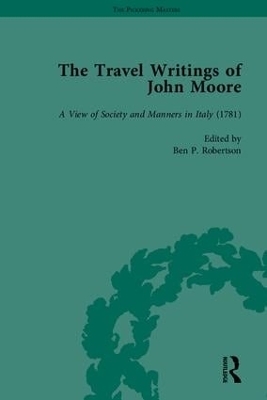
The Travel Writings of John Moore
Pickering & Chatto (Publishers) Ltd
978-1-84893-099-5 (ISBN)
Ben P Roberston is Associate Professor of English at Troy University, where his research and teaching interests include British Romantic literature, Trans-Atlantic/Transnational literature, cultural studies, religion in literature and women's studies. His previous publications with Pickering & Chatto include, Elizabeth Inchbald's Reputation (2013), Inchbald, Hawthorne and the Romantic Moral Romance (2009) and the edited three volume collection, The Diaries of Elizabeth Inchbald (2007).
Volume 1 Introduction: The First Half of Moore's Continental Tour Robert Anderson, The Life of John Moore, MD, With Critical Observations of his Works (1820) A View of Society and Manners in France, Switzerland and Germany (1779) The first volume contains the first half of Moore's travels on a five-year Grand Tour with the 8th Duke of Hamilton, starting in 1772. This epistolary narrative - some of it real, some of it contrived - relates Moore's often humorous observations about the people and cultures he encountered along the way. As the travelogue unfolds, Moore describes specific details of conversations with French, Swiss and German men and women who held a diversity of roles in both the aristocracy and the peasantry. As companion and personal physician to the Duke of Hamilton, Moore was introduced into some of the most prestigious Continental royal society of the time, including the court of Frederick the Great. Also included in this volume is Robert Anderson's 1820 biography of Moore. Explanatory Notes Silent Corrections Volume 2 Introduction: The Second Half of Moore's Continental Tour A View of Society and Manners in Italy (1781) Volume 2 continues Moore's account of his travels with the Duke of Hamilton, focusing on their adventures in Italy. Throughout the narrative, Moore continues his descriptions of the customs and people he encounters, adding his own witty reflections from the viewpoint of a foreigner. Unimpressed by Catholicism, he presents wry descriptions of priests and religious relics through the countryside. In Naples, he narrates 'the famous Neapolitan miracle' of the liquefaction of dried blood said to have been collected from St. Januarius at the saint's beheading. Moore reports that when the miracle does not manifest, the presiding prelates deceive the crowd in the interests of preserving harmony in the community - not to mention their own reputations. Also included is Moore's description of the government of the Venetian Republic and his own experiences at the Vatican during the investiture of Pope Pius VI, with whom he and the duke later had a personal audience. Explanatory Notes Silent Corrections Volume 3 Introduction: Moore's Experiences in the French Revolution A Journal During a Residence in France, from the Beginning of August to the Middle of December, 1792 (1793) One of the most compelling of Moore's narratives, A Journal relates his experiences in revolutionary France in 1792 as the travelling companion of the Earl of Lauderdale. Moore concentrates especially on the embattled French monarchy, describing the reaction of 'le peuple souverain' [the sovereign people] to the aristocracy. Not surprisingly, the witty playfulness of the earlier volumes is largely absent from this narrative. Moore was witness to the aftermath of the 10th of August attack on the Tuileries Palace that marked the end of the Bourbon monarchy. He describes turning away from the grisly scene in disgust at the violence inflicted on the Swiss Guards, and he also narrates his visits to meetings of the National Assembly and the National Convention, during some of which the French royal family were present. Moore even attended several gatherings of the famous Jacobin Club, where he heard inflammatory speeches by Jean-Paul Marat and Maximilien Robespierre. Largely sympathetic to the monarchy, Moore takes great pains to describe the groupthink that characterized the insurgents and prompted much of the violence. Explanatory Notes Silent Corrections Volume 4 Introduction: Coming to Terms with the French Revolution A View of the Causes and Progress of the French Revolution (1795) The final volume contains Moore's thoughts about the genesis of the French Revolution, which he describes as 'one of the most awful events of which history affords any record'. Essentially a work of cautionary historical analysis, this volume presents Moore's assessment of the revolution primarily as a product of the abuse of power in the French government and of the misappropriation of public funds. Moore laments that the revolution, intended to overturn tyranny and despotism, became abusive in its own turn, so that liberty became the watchword of the new oppressors. Ever the constitutional royalist in sentiment, Moore denounces the cruelty and lawlessness of the revolutionaries and calls for all sovereigns to take heed lest they fall into the same errors as had the French royalty. For Moore, the alternative is tantamount to anarchy in which liberty truly exists for no one. Explanatory Notes Silent Corrections Index
| Erscheint lt. Verlag | 1.6.2014 |
|---|---|
| Reihe/Serie | The Pickering Masters |
| Verlagsort | London |
| Sprache | englisch |
| Maße | 156 x 234 mm |
| Gewicht | 2948 g |
| Themenwelt | Reisen ► Reiseberichte ► Europa |
| Geisteswissenschaften ► Sprach- / Literaturwissenschaft ► Anglistik / Amerikanistik | |
| Geisteswissenschaften ► Sprach- / Literaturwissenschaft ► Literaturwissenschaft | |
| ISBN-10 | 1-84893-099-2 / 1848930992 |
| ISBN-13 | 978-1-84893-099-5 / 9781848930995 |
| Zustand | Neuware |
| Haben Sie eine Frage zum Produkt? |